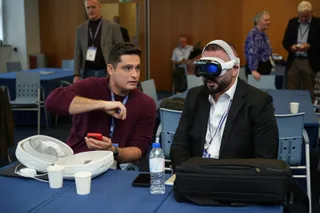CAPE (The Center for Advanced Pediatric and Perinatal Care)
Contact Our Team
For more information about how Halldale can add value to your marketing and promotional campaigns or to discuss event exhibitor and sponsorship opportunities, contact our team to find out more
The Americas -
holly.foster@halldale.com
Rest of World -
jeremy@halldale.com
Barbara Beebe’s first of two articles highlights the innovative work in simulation at CAPE.
Simulation is being used with increasing frequency in healthcare.At CAPE, the Center for Advanced Pediatric and Perinatal Education at Packard Children’s Hospital at Stanford, we use simulation to address human, system and process performance objectives that directly improve the safety, efficacy and efficiency of patient care. As the world’s first simulation program dedicated to the fetal, neonatal, pediatric and obstetric sciences, CAPE seeks to provide healthcare professionals with the cognitive, technical and behavioral skills necessary to deliver competent and compassionate care to children and pregnant women. CAPE is the nexus of simulation expertise and activities at the Lucile Salter Packard Children’s Hospital and its mission is closely aligned with that of the hospital. The CAPE team works closely with the professionals in patient safety, quality assurance and risk management at Packard in order to use simulation as a methodology to directly improve patient care and outcomes. The numerous faculty in the School of Medicine at Stanford University who consider CAPE as their academic home conduct clinically relevant research that uses simulation as the research methodology. Creation of new knowledge enhances not only the field of healthcare simulation but also has a direct impact on patient care by investigating issues that are difficult or impossible to study in the real world.
Extensive and Worldwide Outreach
Now celebrating 10 years in service, CAPE’s training and research programs are recognized internationally for their innovative approach to skill acquisition and performance assessment. CAPE faculty and fellows have published more than 50 manuscripts, presented in excess of 100 abstracts, and delivered well over 200 formal presentations describing our simulation-based training and research work in obstetric, fetal, neonatal and pediatric medicine to audiences on five continents. To date, thousands of trainees from nearly every state in the U.S. and more than 45 countries have participated in our programs.
One of CAPE’s most popular offerings is our Simulation Instructor Program. Often viewed as a national benchmark for those striving to establish simulation-based training at their home institutions, our Instructor Program has attracted professionals from more than 70 global and domestic institutions. The program includes three full days of immersion into the knowledge and skills needed to create and deliver successful simulation-based training experiences focused on pertinent cognitive, technical and behavioral skills, for all members of the multidisciplinary healthcare team. Participants are given the opportunity to design, execute and debrief highly realistic simulated clinical scenarios that serve to improve human performance and patient care.
Our Instructor Program is designed to benefit multidisciplinary teams consisting of physicians, nurses, respiratory therapists and other allied healthcare professionals. We also encourage hospital administrators and experts from patient safety, quality assurance and risk management departments to observe the program. This allows them to understand the value of simulation and offer their support to simulation champions who work within their hospitals to recruit and train staff, secure necessary resources, and manage space, scheduling and reimbursement issues. Indeed, this model of support from hospital administration is a fundamental part of CAPE’s past and future success.
CAPE’s newest program offerings are single, full-day experiences concentrated on two vital aspects of simulation-based learning: scenario design and debriefing. During CAPE’s Intensive Scenario Design Program, trainees learn the intricacies of crafting scalable, highly realistic simulated clinical scenarios that are tailored to meet the needs of healthcare professionals with varying levels of experience using the same core content. Participants leave this program with two fully drafted scenarios tailored to meet the needs of trainees at their home institution.
During CAPE’s Intensive Debriefing Program, participants immerse themselves in a progression of debriefing roles, first as the trainee being debriefed, next as the facilitator or lead debriefer, and finally as the expert, critically evaluating the lead debriefer using objective, real-time assessment tools designed at CAPE. Based on a standard approach used in the fields of aviation and space flight, our objective approach to debriefing is a notable benefit to healthcare trainees and one of several features that makes CAPE unique. While the Intensive Scenario Design and Intensive Debriefing Programs are open to all healthcare professionals, development of these offerings was driven by demands from alumni of CAPE’s Simulation Instructor Program who desired to return to CAPE in order to refresh and deepen these particular skill sets.
Advancing Neonatal Care
CAPE’s work in the field of simulation-based training and research in neonatal resuscitation has contributed significantly to advancements in the care delivered to the neonatal patient population. CAPE’s Founder and Director, Louis P. Halamek, MD, is a practicing neonatologist who works in the level IV neonatal intensive care unit at Packard Children’s Hospital at Stanford. He has been a member of the Steering Committee of the Neonatal Resuscitation Program (NRP) of the American Academy of Pediatrics (AAP) since 2001. In his role as Steering Committee Co-chair from 2007-2011, Dr. Halamek directed the transition of the NRP from a textbook and skills station-based program into a simulation-based immersive learning experience based on CAPE’s NeoSim Program, its intensive neonatal resuscitation training course. In collaboration with the AAP, CAPE co-developed a number of novel training resources including the 2011 NRP Instructor DVD filmed on-site at CAPE, the 2011 NRP Instructor Manual containing program development aids and other original content from CAPE, and a Key Behavioral Skills Wall Chart for display in delivery rooms across the US.
The NRP sets the national standard for the care of newborns in the delivery room in the US and also serves as an international model for healthcare professionals caring for newborns in more than 100 countries. It has over 27,000 instructors distributed throughout the US and has been delivered to more than 3 million trainees during its 25-year history. We are especially proud that the work conducted at CAPE in collaboration with the AAP is influencing the care of mothers and their newborns all around the world. CAPE’s NeoSim Program continues to attract healthcare professionals who wish to experience a rich, full-day experience responding to neonatal emergencies.
Clinical Care at Packard Children’s
CAPE’s simulation services are delivered to Packard Children’s professionals through a model of unit-based simulation task forces.The Center for Nursing Excellence (CNE) at Packard Children’s highlights and supports the important professional role that nurses play in the delivery of care to patients andfamilies. CAPE and CNE have collaborated closely over the last 10 years to provide simulation-based training to each and every nurse across all units of the hospital. Clinical nurse specialists trained in CAPE’s Simulation Instructor Program combine annual goals formed at the executive level of the hospital with unit-specific goals to form the learning objectives for their unit’s simulation curriculum. This model of unit-based simulation is a national example for building a successful large-scale simulation program.
In order to ensure a direct link to clinical care, CAPE originated the Packard Circle of Safety, the process that defines how simulation is integrated into the daily activities of the hospital. In the circle, the care of real patients is assessed by the hospital’s risk management, quality assurance and patient safety groups to inform and define training conducted at CAPE. Upon completion of simulation training at CAPE, in-hospital drills further identify and refine issues of human and system performance, improvements from which feed directly into the care of real patients. This mechanism that triggers tight collaboration with key hospital leaders in the areas of risk, quality and safety makes CAPE unique in its ability to provide extremely relevant simulation training.
Collaboration with Industry
An expert in the field, CAPE has worked with a number of industry players to develop and field test new technologies for use in simulation-based learning. These include an interface to control bedside monitor data streams (Patient Monitor Driver™, Advanced Medical Simulation, Inc.), a fetal monitor simulator (FetalSim™, Advanced Medical Simulation, Inc.) and a number of neonatal, infant, pediatric and obstetric patient simulators (Laerdal Medical, Inc.). We have also actively collaborated in the development and implementation of a novel high definition audiovisual system tailored to meet the needs of simulation centers (Apple, Inc., VMI, Inc. and Spark Alley, Inc.).
Community Outreach
CAPE’s outreach to the community at large contributes to the buzz of daily activity that takes place within its walls.Our international reputation brings professionals from academic institutions far and wide to serve as visiting faculty, enabling partnerships and dissemination of simulation as a methodology to promote better care for children and pregnant women worldwide. Similarly students from national and international healthcare professional training programs come to CAPE seeking to conduct research in the domains of pediatric and obstetric medicine, human performance and simulation. With the support of preceptors at Packard Children’s, CAPE hosts local graduate nursing students who strive to fulfill their education and experience requirements in their profession. Last, but certainly not least, we welcome tours and partner with summer programs on the Stanford University campus to provide high school students with an experience that provides great insight into careers in pediatric and obstetric medicine, adult learning, human performance and simulation.
Future Directions in Research
Building on our strong research tradition, CAPE is investigating human performance during emergency patient care scenarios. Central to the ongoing discovery of optimal functioning is the inquiry regarding the psychophysiology of peak performance. This is a specialty of Dr. Gary Hamill, Senior Research Scholar at CAPE, for which more detail will be presented in a subsequent on-line issue of MEdSim magazine, www.halldale.com
Teamwork
CAPE’s core team consist of the following professionals:
- Louis P. Halamek, MD, CAPE’s Founder and Director, is a Professor in the Division of Neonatal and Developmental Medicine, Department of Pediatrics, and the Division of Maternal-Fetal Medicine, Department of Gynecology and Obstetrics (by courtesy) at Stanford University. Dr. Halamek is an internationally recognized pioneer in the field of simulation-based training and assessment in healthcare. Through his work as Senior Fellow and Adjunct Faculty in the Center for Aviation Safety Research in the Department of Aviation at the Parks College of Engineering, Aviation and Technology at St. Louis University, he has had the opportunity to interact with and learn from professionals working in multiple high-risk industries
- Gary Hamill, EdD, a Senior Research Scholar and Program Manager at CAPE, specializes in human performance optimization. Through applications of simulation, team science, self-regulation, and psycho-neuromuscular theory, Dr. Hamill works with healthcare professionals to further develop their adaptive expertise, situational awareness, and medical decision-making skills to drive their overall engagement and effectiveness in the delivery of patient care. .
- Kim Yaeger, RN, M.Ed., is a Senior Simulation Specialist at CAPE with over 10 years of team-based simulation expertise. She possesses a Masters in Medical Education, focusing on curriculum design and instruction using the methodology of simulation.
- Julie Arafeh, RN, M.S.N., a Senior Simulation Specialist at CAPE, has extensive experience in both simulation-based training and as an obstetrical nurse in outpatient and inpatient settings. . Her focus is on using simulation to identify and improve human, process and system interactions.
- Alice Oliver, B.S.N., a Simulation Specialist at CAPE, has fifteen years of neonatal and pediatric critical care experience. Oliver, Arafeh and Yaeger form the core team that develops, plans and delivers CAPE’s team-based simulation training programs.
About the Author
Barbara M. Beebe is the Business Manager at the Center for Advanced Pediatric and Perinatal Education, Division of Neonatal and Developmental Medicine, Stanford University School of Medicine.


